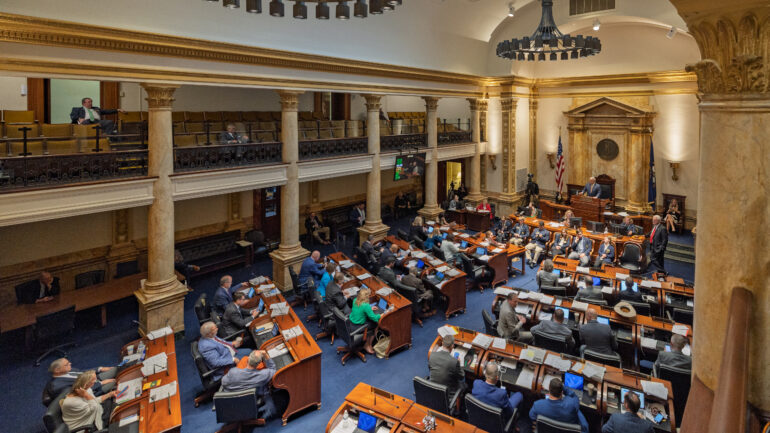After rushing to get the last stack of bills passed, the 2025 Kentucky legislative session came to an end on March 28, 2025. Inside the state capitol, lawmakers filed more than 800 bills in the House and 300 in the Senate. Over the course of the 2025 legislative session, 140 bills were passed ranging from ending DEI in higher education, changes to Medicaid and the lowering of Kentucky’s income tax. Not unlike other sessions, the 2025 legislative session saw a number of controversial bills.
In the final hours before the session convened, the House and Senate overrode a number of vetoes issued by Gov. Andy Beshear. Kentucky is one of 20 state legislatures where Republicans have a veto-proof supermajority. As a result, both branches overrode nearly all of Beshear’s 29 vetoes.
Among the most significant bills that were passed over Beshear’s vetoes includes House Bill 4 which ends initiatives regarding diversity, equity, and inclusion (DEI) in all Kentucky’s public colleges and universities. The bill puts an end to any programs or employees devoted to the cause of promoting diversity on college campuses. The bill also has implications for affirmative action in regard to hiring and scholarship applications.
Another education related bill, Senate Bill 19, requires Kentucky K-12 schools to implement a minute-long seated moment of silence during the first class of each school day. The bill states that students can pray, meditate, or engage in other silent activities.
House Bill 495 was another controversial bill that banned Kentucky’s Medicaid programs from funding gender affirming surgeries and makes conversion therapy legal in Kentucky. The bill reverses an executive order issued by the governor in September which banned the use of state funds on conversion therapy for minors.
Another bill relating to Medicaid was House Bill 695 which will now have a work requirement. The bill states that able bodied adults ages 18-60 without dependents will have to enroll in a job placement program or work to receive benefits. Beshear stated that the bill will “put up barriers to and delay health care for Kentuckians.” Republicans cited the increasing cost of Medicaid for the introduction of the bill.
Other notable bills include House Bill 90, which would clarify language about when it is “medically necessary” to legally intervene with an abortion to save the life of pregnant women.
Senate Bill 89 narrows the definition of waters that are regulated by the Kentucky Division of Water and has raised alarm with clean water advocates about its threat to groundwater, jeopardizing the drinking water of hundreds of thousands of Kentuckians.
While many bills passed over Beshear’s veto, some measures were met with agreement from the governor including a bill lowering the state’s income tax. Receiving bipartisan support and signed into law by the governor, House Bill 1 will lower Kentucky’s income tax from 4% to 3.5% beginning on Jan, 1 2026.
Mirroring twenty-three other states with similar bills, House Bill 15 has reduced the age for an instructional driving permit in Kentucky from 16 to 15. Beshear stated that the bill would “help working families better juggle all of life’s activities.”
While the House was able to pass a resolution returning a granite monument engraved with the Ten Commandments to the Capitol, this session did not see the passage of House Bill 65 which sought to display the Ten Commandments in public school classrooms.
Additionally, water will remain fluoridated across the state after a bill introduced to remove the statewide mandate requiring drinking water to be fluoridated failed to garner votes in the Senate. The bill is one of dozens filed in Kentucky in the past decade, marking a trend across the country to lift mandated fluoridation.
The 2025 legislative session saw the passage of a number of controversial bills, often passing without the support of the Democratic minority and overturning vetoes from the governor.
While the passage of bills for the 2025 session has come to an end, it also marks the last session that will take place in the State Capitol building, at least for the next couple of years. Ongoing renovations will result in lawmakers convening in temporary chambers for the 2026 legislative session.
The 2026 legislative session will begin on Jan. 6, 2026, with the focus of that session on the budget. Lawmakers will gather in June to prepare for next year’s legislative session.
Photo courtesy of Kentucky General Assembly.



